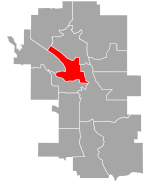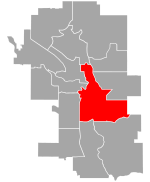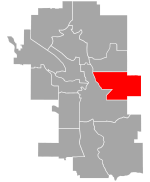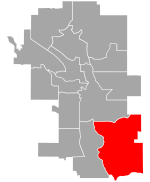Calgary City Council
| Calgary City Council | |
|---|---|
| Type | |
| Type | |
| History | |
New session started | November 2017 |
| Leadership | |
|
Naheed Nenshi Since October 25, 2010 | |
| Structure | |
| Seats | 15 |
| Committees | Boards, Commissions and Committees |
| Elections | |
Last election | October 16, 2017 |
Next election | October 2021 |
| Motto | |
| Onward[1] | |
| Meeting place | |
| Calgary Municipal Building[2] | |
| Website | |
|
www | |
The Calgary City Council is the legislative governing body that represents the citizens of Calgary. The council consists of 15 members: the chief elected official, titled the mayor, and 14 councillors. Naheed Nenshi was elected mayor in October 2010 as the city's 36th. Each of the 14 councillors represent one of the city's 14 wards.
Elections
The mayor of Calgary is elected through a citywide vote by all eligible voters. The mayor represents the interests of the city as a whole. The councillors are elected by the constituents of each ward. The councillors represent the interests of their respective wards. The mayor and councillors hold the office for 4-year terms. The last municipal election was held on October 16, 2017.
Governing system
Calgary's City Council is a council-policy committee system. The Council establishes its policies for governing the city based on information provided by four standing policy committees:
- Planning and Urban Development
- Transportation and Transit
- Utilities and Corporate Services
- Community and Protective Services
These committees meet once every month at City Hall and are composed of councillors and are responsible for approving and recommending policies to City Council. The general public is invited to the committee meeting to make presentations. Any decisions that come out of these meetings need final approval from the Council as a whole.
There are also a number of civic committees, boards, and authorities that help to create policies in specialized areas, such as parking, the preservation of heritage sites and buildings, and planning and development matters. These civic committees, board and authorities consist of citizens and one or more alderman.
City Council meets three Mondays every month in the Council Chambers at the Calgary Municipal Building. Two meetings are regular Council meetings, where issues from the four policy committees are discussed. The third meeting is a public hearing, where planning matters are generally discussed. Citizens do not address Council during the two regular meetings, however the public hearings are designed for the citizens to speak directly with their elected aldermen regarding specific issues.
Financing
The city had an operating budget of $2.1 billion for 2007, supported 41% by property taxes. $757 million in property taxes are collected annually, with $386 million from residential and $371 million from non-residential properties.[3] 54% of the budget is spent for wages of the 13,043 city employees and expeditures. The average Calgary household pays approximately $2,100 per year in city tax.[4]
History
Mayor
From 1823 to 1923, mayoralty elections were held annually. A plebiscite held in 1923 increased the term in office for the mayor from one to two years. In 1968, the Municipal Act increased the term in office by one year, for a total of three years. In 2013, the term for mayor was amended in the Local Authorities Election Act to 4 years.[5][6]
Councillors
From 1884 to 1886, four councillors were selected from the town. In 1894, Calgary was divided into three wards, increasing the number of councillors to six. Later, three aldermen represented each ward. In 1906, a fourth ward was created, bringing the total number of aldermen to 12. From 1914 to 1960, aldermen were elected from across the city for two-year terms, dismantling the ward system. Staggered elections made half the council up for election each year. Commissioners were also elected in the early years. From 1917 to 1971, councillors were elected using single transferable votes to achieve a degree of proportionality/ fairness. After a plebiscite in 1960 the ward system was re-established in the city. Six wards were established, each represented by two aldermen. In 1974, voters had up to two votes under the block voting system to elect the two councillors in their ward. In 1976, the number of wards expanded to 14 (current number) with one alderman representing each ward for three years (and voters having only one vote). On December 14, 2010, council voted to change the title to councillor, which took effect in the October 2013 election.[7] In 2012 the Local Authorities Election Act was amended to increase the term length to 4 years.[8][9]
Wards, communities and councillors
See also
References
- ↑ "Onward". calgary.ca. Archived from the original on 2013-08-08. Retrieved 2013-08-20.
- ↑ "Municipal Building". calgary.ca. Archived from the original on 2013-10-31. Retrieved 2013-08-20.
- ↑ City of Calgary (January 2007). "Financial Facts" (PDF). Archived from the original (PDF) on 2009-11-17. Retrieved 2007-03-13.
- ↑ $386 million were collected from 332,955 occupied dwellings in 2006
- ↑ "Election Accountability Amendment Act, 2012 - Section 105" (PDF). 2012 Bill 7, First Session, 28th Legislature. Legislative Assembly of Alberta. December 5, 2012. Retrieved December 9, 2012.
- ↑ "Local Authorities Election Act, RSA 2000, c L-21". CanLII. Archived from the original on 2017-09-14. Retrieved 2016-01-04.
- ↑ Jason Markusoff (December 14, 2010). "Calgary rejects alderman label after 116 years". Calgary Herald. Archived from the original on December 18, 2010. Retrieved December 14, 2010.
- ↑ "Election Accountability Amendment Act, 2012 - Section 105" (PDF). 2012 Bill 7, First Session, 28th Legislature. Legislative Assembly of Alberta. December 5, 2012. Retrieved December 9, 2012.
- ↑ "Local Authorities Election Act, RSA 2000, c L-21". CanLII. Archived from the original on 2017-09-14. Retrieved 2016-01-04.













